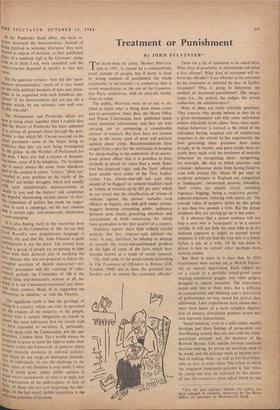Treatment or Punishment
By JOHN SYLVESTER* its harm done by crime,' Herbert Morrison said in 1945, 'is caused by a comparatively small number of people; but if harm is done by wrong methods of punishment the whole community is answerable'—a contention that is worth resuscitating on the eve of the Conserva- tive Party conference, with its sixty-stix resolu- tions on crime.
The public, Morrison went on to say, is en- titled to know what is being done about crime and its prevention. Since then, the Home Office and Prison Commission have published much more statistical information; and they are now carrying out or sponsoring a considerable amount of research. But facts have not loomed large in the recent spate of press and political opinion about crime. Recommendations have ranged from a plea for the restitution of hanging for sheep-stealing to the contention of an anony- mous prison officer that it is pointless to keep anybody in prison for more than a week. Emo- tion has displaced logic; and the 'facts' offered have usually been either of the Tory Ladies' variety env sixteen-year-old son says they should all be flogged') or isolated headlines such as 'crimes of violence up by 207 per cent.' which do not reveal that the classification of `crimes of violence against the person' includes such offences as bigamy, sex with girls under sixteen, buggery between consenting adults, indecency between men, incest, procuring abortions and concealment of birth—convictions for which have quintupled in the past quarter of a century.
Statistical reports mean little without careful analysis; but they impress—and mislead—the voter. It may, therefore, be salutary to attempt to reassess the crime-and-punishment problem in the light of some of the facts which have become known as a result of recent research.
The chief aims of the penal system (according to The Treatment of Offenders in Britain, COI, London, 1960) 'are to deter the potential law- breaker and to reform the convicted offender.' There are a lot of questions to be asked here. What kind of possibility of punishment will deter a first offence? What kind of treatment will re- form the offender? Is an offender to be reformed by his treatment or deterred by fear of further treatment? Who is going to determine the method of treatment/punishment? The magis- trates (i.e., the police), the judges, the prison authorities, the administrators?
Most of these are really scientific questions. They concern why people behave as they do in a given environment and why some individuals behave differently from others. Now, most mam- malian behaviour is learned, is the result of the individual having acquired sets of conditioned responses to the stimuli he has experienced; the laws governing these processes have come broadly to be known; and great strides have re- cently been made with the treatment of neurotic behaviour by recognising them: recognising, for example, the way in which neurotic—and criminal—behaviour stems from having failed to cope with normal life. About 80 per cent. of recidivist prisoners in England are categorised as 'inadequate': introverted, neurotic, friendless. Their crimes are usually trivial, including vagrancy, begging, `being a suspicious person,' indecent exposure, loitering with intent, etc. The average value of property stolen by this group is less than two pounds a time. But the prison sentences they are serving go up to ten years.
It is obvious that a prison sentence will not help a man who is 'inadequate' to be a success outside. It will not help the man who is in for indecent exposure to adjust to normal sexual relations; it will not find the man who is a lonely failure a job, or a wife. All he can learn in prison is how to commit other (perhaps more serious) crimes.
But there is more to it than that. In 1954 experiments were carried out at McGill Univer- sity on sensory deprivation. Each subject lay on a couch in a partially sound-proof room wearing translucent. goggles and other gadgets designed to reduce sensation. The experiment lasted only two to three days, but a difficulty in concentration and thinking and a dim'nution of performance on tests lasted for seve:al days afterwards. Later experiments have shown that a mere three hours of a more complete depriva- tion of sensory stimulation produce severe ten- sion and even hallucination.
'Social isolation,' even to a mild extent, usually develops just those feelings of persecution and free-floating anxiety that are seen with the inade- quate-type prisoner and the denizens of the Rowton Houses. Life outside involves continual decision-making. In prison no decisions need to be made; and the'prisoner tends to become terri- fied of making them--as well as less knowledge- able on how to make them. The extent to which the long-term inadequate prisoner is 'lost' when he comes out may be indicated by the answer of one old ex-convict when asked which he had * For the past eighteen months the author has been engaged in research, sponsored by the Home Office, on prisoners in Wandsworth Gaol. preferred of the many prisons he had been in. He said: `Strangeways—there's a Salvation Army just down the road where they give you food And a kip. You see, it's just by and you don't have to take a bus or anything.'
About three-quarters of this inadequate popu- lation either make no attempt to avoid arrest or actually give themselves up to the police; the reason being not that prisons are too 'soft,' But that prison is the one place where these people are free from anxiety. This point about anxiety cannot be too strongly emphasised; at the international Congress in Denmark this summer a symposium made out an almost un- assailable case for the theory that schizophrenia is learned as one way of avoiding the anxieties connected with the making of decisions in the world. So with recidivists, the periods between successive convictions become shorter and shorter until they diminish to only a few days or sometimes even hours.
The recidivists are really a workhouse popula- tion. Why not, then, make the prisons into work- houses?—not in the old style, but factories, where a man without money or a home or a direction could go, freely, and obtain food, shel- , ter and pocket money, doing productive work for whatever periods he can manage. Such fac- tories could also offer training courses along the lines -of those provided for the blind or dis- abled people.
What of the 20 per cent. of recidivists who are not 'inadequate'? American colleagues of mine point out that this is comparative only; the really adequate criminal is rarely found in prison —at any rate for the reason he ought to be there. 1 agree: the real criminals (except mur- derers) rarely get caught.
From a study on prisoners in Israel, Professor Seigman concludes that boredom is a great fac- tor in producing the crimes of this group; British and American studies would seem to con- firm this. The big breaker-and-enterer, say, usually has an intelligence that is too high for the only jobs he can get. Half of them were institutionalised (Borstal or Approved School) at a comparatively early, age—some for such things as stealing apples or taking-and-driving- away, olTences for which individuals from a higher social background would never have been brought to court. They are not so much vicious as frustrated. They take to crime for adventure, in the first place, and because of the psychopathic urge to 'have it now' with no regard for the future.
Then, after a crime has been committed, anxiety begins to grow and feeds upon itself until the criminal gets himself arrested some- how—whereupon the anxiety is gone (prisoners on remand sleep and eat enormously). This anxiety-reduction acts as a reinforcement for the original behaviour—when they conic out they do it again, and so on. Their behaviour is compulsive, not greedy, or vicious: they know they will be going back inside, although they do not, like the inadequate, want this: they cannot help themselves.
The treatment for these would seem, again, to be the prison factory, where they would be given positions of leadership and also educated. This type of approach works well with prisoners who are allowed to work outside. With these prisoners, also, one can often see, apart from the boredom, how it was that their criminal be- haviour was acquired by accidental conditioning in early life—the early misdemeanour praised by mother as a sign of cleverness, etc. This is just the sort of thing which can be dealt with in a month or so by the right methods.
The prison authorities are these days doing everything they can, but what is needed is a change in the whole penological/legal system. and much more publicity about and research into police methods, court practices and the per- sistence of laws which are inappropriate in our present-day rat-race.
A former famous British county chief con- stable once said to a constable who had obtained a good many convictions, 'Young man, you seem to spend most of your time in court: I think you do not like the job you are supposed to be doing.' Much of the so-called increase in crime is a matter of increase in convictions for quite trivial, morally speaking, 9ffences; through- out the Western world there is a correlation be- tween numbers of crimes committed per head of population and number of policemen per head of population.
There are ways of prevention other than .de- terrence.' The Conservative Party conference has a lot of items on its agenda concerned with crime. Who there, I wonder, will see the rele- vance of their Government having increased the pay of the police while refusing the teachers? If you produce a real 'lower' class by running the educational system into the ground, you will also produce a real class of !criminals.'







































 Previous page
Previous page